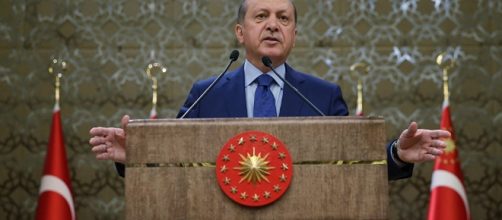With a fifty-one percent expected "yes“ vote, according to the various public opinion polls conducted, the Turkish president Recep Tayyip Erdogan might legalise his desire to completely change the Turkish political system and gain enormous political power. Some 55 million Turks will turn out and cast their ballot on Sunday, April 16. If successful, the position of prime minister will cease to exist and all executive powers will be delegated solely to the president.
This kind of presidential system is part of an unrealistic dream put forward by ex-prime minister Ahmet Davutoglu.
He envisioned Turkey in 2023 when a hundred years of Turkish Republic will be celebrated, as mighty and powerful as was once the Ottoman Empire. But such greatness is not easy to achieve. Erdogan did start socio-political and judicial reforms that brought the largest democratic changes in Turkey in decades; yet in 1999 the Economist reports that he practically said that democracy is like a train – when you reach your destination, you step out.
More powerful than Atatürk
Instead of sustainable reforms, "the Boss“ as he is being called in Turkey, went to a systematic Islamisation, assumed great powers and transformed Turkey to an autocratic state with his final word on practically anything. His role as the father of a new Turkey is akin to the Republic's founder Kemal Pasha Atatürk but in a different direction.
With new authority, however, Erdogan will be more powerful than Atatürk ever was.
In order to crush any opposition, Erdogan marginalised and eliminated anyone who might oppose him. This included both members of the ruling AK Party, and secularists, Islamists, and army officers. No other ideas or questioning of Erdogan's decisions are allowed. Not even his closest allies are safe. When Davutoglu raised objections to the Erdogan's Kurdish policies, he was replaced by the office of prime minister. And while his government was several times accused of corruption, Erdogan defended himself using calling them conspiracy theories and calling his political adversaries the enemies of the state.
Once his ally, the charismatic cleric Fethullah Gülen became a perfect scapegoat for all the ailing in the Turkish society.
The July 2016 military coup attempt was indeed „a gift of God“, as Erdogan exclaimed after the putsch was crushed. It allowed a massive attack on institutions, NGOs, media, judiciary, army, private sector. By silencing anyone who opposes, Erdogan and his elite became sultan-like figures on top of any public or private initiative. And sultan he is, at least according to the Ottoman symbolism he uses in architecture, celebrations, and customs. He even thinks of making the national anthem more Ottoman in sound!
Foreign ambivalence of a Caliph wanna-be
A sultan, of course, can be as strong as he is perceived to be in the international realm. Some fifteen years ago, Ankara intended to be a major player on the world scene and regional power in the Balkans, Middle East, and the Black Sea.
But from the politics of 'zero problems' with the neighbours, Turkey came to problems with every neighbour. Nowadays Turkey stops the reunification process in Cyprus, blocks Armenian diplomatic endeavours, binds the Iraqi Kurdistan regional government to Ankara, and plays on the vital economic dependence of smaller Balkan countries. Syria is a special case. Every aspect of Turkish-Syrian politics is ruined, the Operation Euphrates Shield suddenly ended without any visible goal fulfilled, reports Aljazeera but Erdogan still presents himself as a victorious leader.
Historical Ottoman sultans were also caliphs of the Islamic world. Erdogan wants this position as well. He sees himself as the leader of the Sunni world, protector of Islamic values and traditions, custodian of the autocratic state and illiberal democracy.
The Turkish mosques are used for political recruitment, and all of the imams are by the law obliged to follow the sermon frameworks presented by the government.
Thus, Islamists are not happy with the use of religion for political aims as well. But, if they challenge the current system, they may be the next target of Erdogan's Rottweilers. AK Party may have been once an Islamic party, but the loyalty lies not in Islamists but in Erdoganists. This is the simplest dichotomy existing today in Turkey: Erdoganists on one side, with everyone else on the other. If the referendum turns successful for the former, the latter can only be servants of the sultan.

